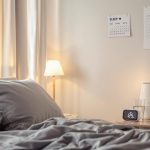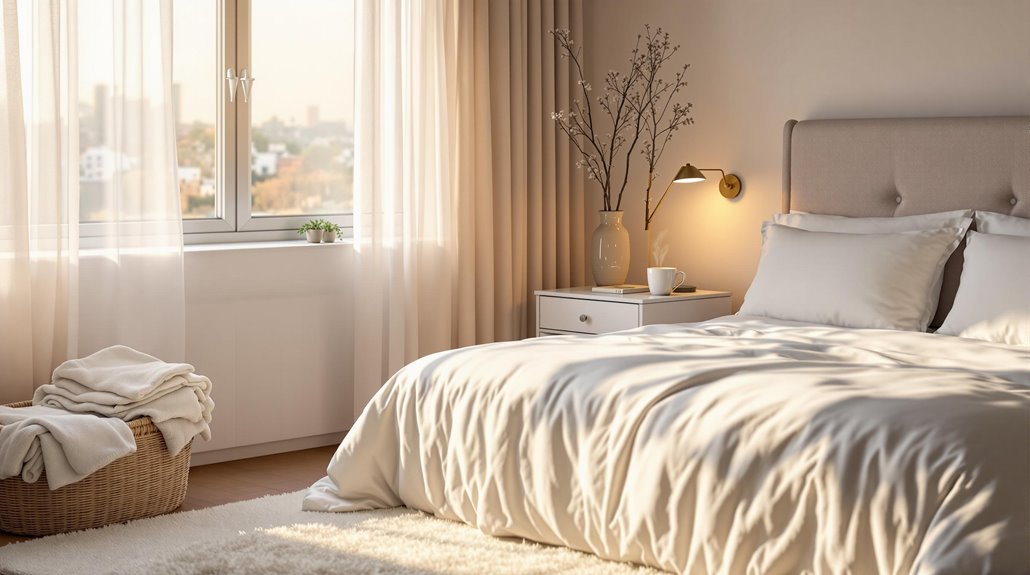
Improving your sleep hygiene can greatly boost your wellness. Start by setting a consistent sleep schedule to align with your natural circadian rhythm. Create a calming bedtime routine and make your bedroom a cozy, quiet sanctuary. Limit stimulants like caffeine and alcohol before bedtime and embrace regular physical activity. Manage meal timing and nutrition to avoid late-night digestion issues. Minimize light and noise disruptions using blackout curtains and white noise machines. Embrace natural light during the day to reinforce your body’s sleep-wake cycle. These simple adjustments can transform your sleep quality and overall well-being. Discover more about enhancing your rest.
Consistent Sleep Schedule
A consistent sleep schedule does wonders for your health, both physically and mentally. By sticking to a regular bedtime, you respect your body’s natural circadian rhythm, which can dramatically improve your sleep quality. Your immune system becomes more robust, lowering your risk of chronic diseases like diabetes and heart conditions. You’ll find it easier to maintain a healthy weight as your digestive system aligns with your sleep-wake cycle. These changes might sound subtle, but they profoundly enhance your heart health and overall energy. Establishing consistent sleep habits can encourage better sleep hygiene by promoting relaxation and emotional regulation, ultimately leading to a more restful night and increased stress resilience.
On the mental front, regular sleep patterns sharpen your focus, elevate your mood, and keep anxiety at bay. Imagine waking up refreshed, ready to seize the day with improved cognitive abilities and sound decision-making skills. Establishing consistent sleep habits can reduce stress levels and result in a 30% lower risk of mortality. Your new sleeping habits provide a sturdy shield against stress, boosting your daily performance and productivity. Feel the freedom of a clutter-free mind, tailored to navigate life’s challenges seamlessly.
Embrace this newfound liberation by securing long-term health benefits. Lower your mortality risk, stave off hypertension, and foster greater longevity just through consistent sleep.
Experience the joy of a vibrant life with a simple commitment to respecting your natural rhythms.
Relaxing Bedtime Routine
While a consistent sleep schedule lays the foundation for restful nights, crafting a relaxing bedtime routine truly enhances your sleep experience. Imagine the liberation of letting go of the day’s chaos as you dim the lights and step away from your screens. By creating a sanctuary free from bright light, you signal your body to wind down.
Bedtime rituals such as aroma therapy with lavender can transport your mind to a tranquil place, preparing you for a deeper rest. Incorporate calming music to soothe your soul. Gentle melodies can work wonders, releasing feel-good hormones that ease stress and uplift your mood. Engaging in bedtime rituals serves as self-care, fostering long-term health benefits and enhancing overall well-being. Regular exercise releases endorphins, which improve mood and focus, making physical activity a valuable part of your daily routine.
Complement this with a warm bath, allowing its warmth to wash away tension, or engage in gentle stretching to relax those tightly wound muscles. Practicing deep breathing or foam rolling further enhances this release, offering a pathway to calm.
Mentally unwinding is just as essential. Try a few moments of meditation or jot down your thoughts to clear your mind. Gratitude rituals, visualization, and reading non-stimulating content can cultivate inner calm.
Listen to nature sounds, bringing the serene beauty of the outdoors into your space. Each element synergizes, transforming bedtime into an act of self-liberation.
Optimize Sleep Environment
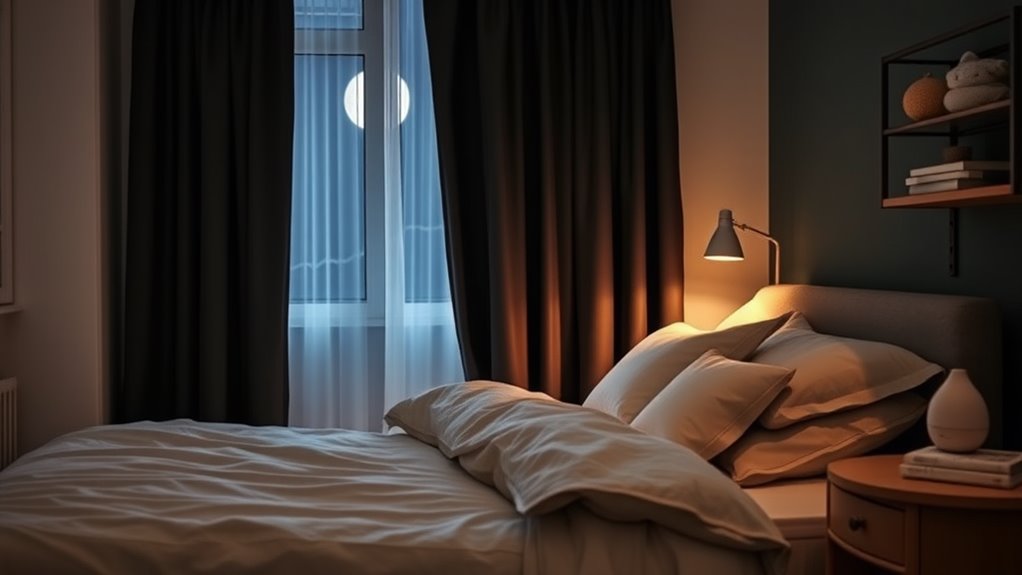
Your sleep environment plays a pivotal role in attaining restful and rejuvenating sleep. You deserve the freedom to embrace a sanctuary that’s both serene and invigorating.
Start by exploring how bedroom colors affect your mood. Cool tones like blues and greens can create a calming atmosphere, guiding you into peaceful slumber. Proper walking form during the day can enhance your sleep, as engaging the core and maintaining posture contribute to both daytime activity and nighttime relaxation.
Adjust your surroundings to match your ideal sleeping positions. Whether you prefer sleeping on your back, side, or stomach, having a comfortable mattress and supportive pillow is essential—these items tailor to your body’s needs, enhancing your sleep experience.
To further optimize your sanctuary, block out light with blackout curtains, and lower the room’s lighting to signal bedtime. Avoid screen lights before bed, and consider sleep masks if darkness is elusive. Light management is crucial as exposure to light inhibits melatonin production, affecting sleep quality.
Maintain a cool room temperature, ideally between 65 to 68 degrees Fahrenheit, to bolster comfort throughout the night. Breathable bedding can help prevent overheating, ensuring you stay cozy without disturbance.
Limit Stimulants Before Bed
Having crafted a perfect sleep environment, it’s time to contemplate what you put into your body before you hit the hay. The substances we consume greatly influence our sleep quality, especially stimulants like caffeine, nicotine, and certain medications. These stimulant types sneakily increase wakefulness while disrupting your precious sleep patterns. Insomnia and fragmented sleep are common consequences, and you may even find yourself battling rebound hypersomnia after these disruptions. Your REM sleep, vital for cognitive rejuvenation, takes a hit too, leaving you less refreshed. It’s also important to acknowledge that hydration guidelines recommend moderating your fluid intake during the evening, as excessive consumption can lead to frequent bathroom trips that disrupt sleep.
The short-lived boost in cognitive performance some stimulants offer comes at a steep cost. Nonmedical stimulant use often begins in middle and high school, and contributes to normalization of using such substances among youth. If you find yourself reaching for a stimulant to power through dull tasks or late-night thinking sessions, consider the long-term sleep impact—decreased deep sleep, essential for memory and advanced problem-solving.
Abstaining from coffee, energy drinks, or nicotine products as night approaches can open the door to sounder sleep. Prescription and over-the-counter medications warrant caution too. Even morning doses can wreak havoc by nightfall. Consult with healthcare professionals about timing and alternatives, especially if managing conditions like ADHD.
Embrace the freedom of unbroken, meaningful sleep by curbing stimulants well before bedtime.
Manage Daytime Activities
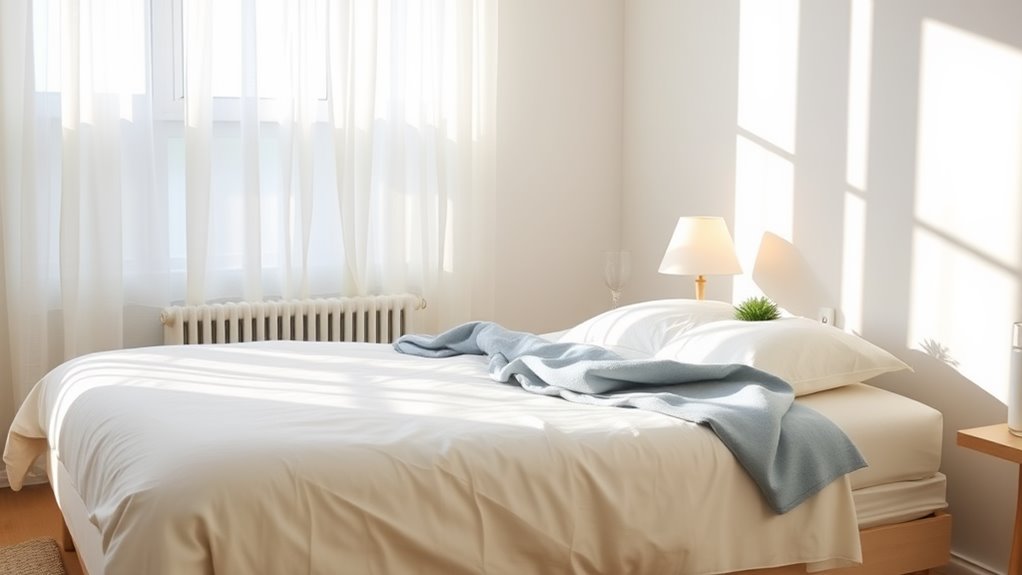
Optimizing your daytime activities can play an essential role in improving your sleep quality. Embrace a consistent routine that boosts daytime productivity and creates balance.
Start by aligning your sleep schedule, even on weekends, to foster a consistent sleep-wake cycle. Morning walks or outdoor activities invigorate your senses and set a positive tone for the day, enhancing your energy management. Regular exposure to natural light, preferably in the morning, aids in regulating your biological rhythms and keeping your energy levels at their best.
- Consistent Sleep Schedule: Stick to the same bedtime and wake-up time daily for steadier energy.
- Exercise Wisely: Complete workouts at least 3 hours before bed, ensuring energy peaks without compromising sleep.
- Daylight Exposure: Aim for 30 minutes of sunlight exposure during the day to boost alertness and improve nighttime rest.
- Mindful Nourishment: Choose a balanced diet and limit caffeine and alcohol to support natural energy flow.
These changes encourage a harmonious blend of activity and relaxation, freeing your mind from the constraints of fatigue. Understand how circadian rhythm influences your energy throughout the day, and you’ll be better able to synchronize your activities with natural energy peaks.
Prioritize smart energy choices, and you’ll find yourself not only more liberated but also more refreshed when morning comes around.
Address Sleeplessness
After enhancing your daytime habits, tackling sleeplessness itself can further improve your nightly rest. A disciplined approach towards sleep can help you overcome common sleep disorders and pinpoint potential insomnia causes.
Start by setting regular bedtimes and waking up at the same time every day, even on weekends. This consistent routine strengthens your circadian rhythm, allowing your body to anticipate rest at predictable times.
Create a sleep-friendly environment by cooling your room to around 65 degrees Fahrenheit and ensuring it’s quiet and comfortable. Dimming lights after dark will encourage melatonin production, aiding in a more natural sleep progression. Use blackout curtains or a sleep mask to block out any disruptive light and wear earplugs to minimize noise.
A relaxing bedtime routine can also combat sleeplessness. Engage in calming activities like reading or meditating about an hour before bed. Avoid screens and other stimulating activities during this period to help your mind wind down.
Limit sleep-disrupting behaviors by steering clear of caffeine, nicotine, and alcohol before bed. Avoid napping in the daytime to maintain a robust “sleep drive” at night. These proactive measures empower you to enjoy restful, rejuvenating sleep.
Avoid Heavy Meals at Night
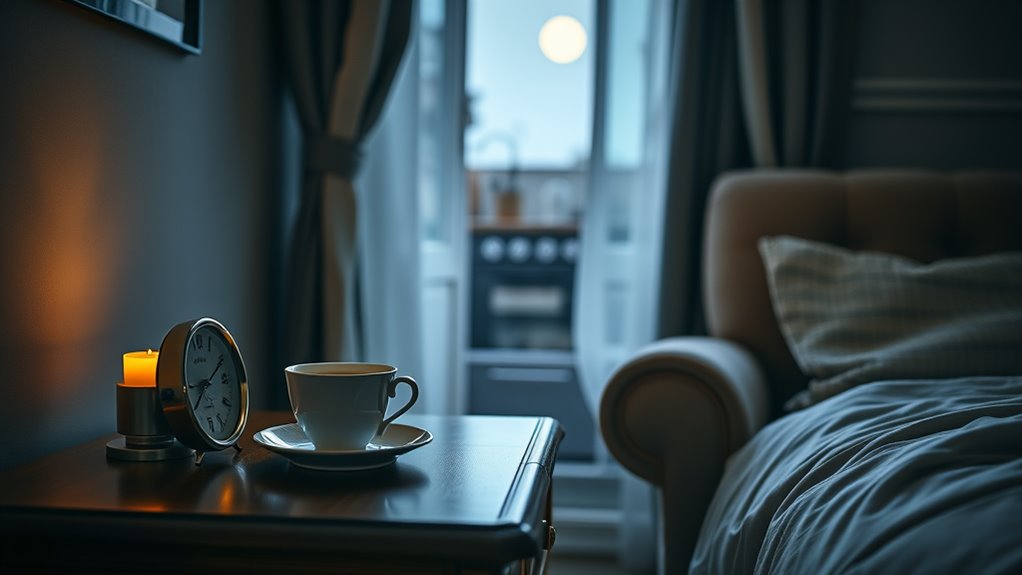
Late-night dining can often lead to restless nights and disrupted sleep patterns. When you indulge in heavy meals close to bedtime, your body remains busy digesting instead of winding down. Spicy or high-fat foods can intensify this discomfort, causing indigestion or heartburn.
Embrace the liberating feeling of a restful night by mastering meal timing. Dining at least 2-3 hours before sleep allows your system the necessary downtime.
Instead of reaching for a large dinner late at night, consider your snack choices:
- High-carbohydrate snacks like crackers or fruit can boost serotonin levels, helping you relax into sleep.
- Avoid sugary or fatty options such as candy bars, which stimulate rather than soothe.
- Promote calm with selected foods: milk, cherries, and nuts are linked to improved rest.
- Restrict heavy, greasy items which keep your digestive system on overdrive.
Ultimately, sticking to lighter meals in the evening clears the path for freedom from nightly disruptions.
Craft a routine that respects your body’s need for quietude as you prepare for the next day’s adventures. Say goodbye to those sleep-deprived chains and embrace the energy that comes from a blissful night’s sleep.
Minimize Noise and Light
In the delicate orchestra of sleep, minimizing noise and light can be your conductor, guiding you towards a restful night. You crave liberation from restless nights, and cultivating a serene environment is key.
Start by employing sound absorption techniques. Seal gaps with acoustic sealant to ward off intrusive noise. Hang heavy curtains; they’re not just for show—they absorb sound and block outside commotion. Consider hushing disturbances with a trusty white noise machine or fan to provide consistent background noise. Earplugs or noise-canceling earbuds can be handy allies if silence is what you seek.
Next, embrace the art of light blocking to guarantee tranquility. Install blackout curtains to fend off pesky streetlight streams. Sleep masks might become your new best friend, effectively shutting out any wandering rays. Keep gadgets on silent; their distracting glows and notifications won’t disrupt your peace.
Strategically place furniture to shield you from external illuminations, moving beds away from glaring windows. For enhanced liberation, soundproof the bedroom with acoustic tiles or strategic furniture positioning for both sound and light blockages.
Your path to sleep freedom involves crafting a haven that invites only the lullaby of your dreams.
Embrace Natural Light
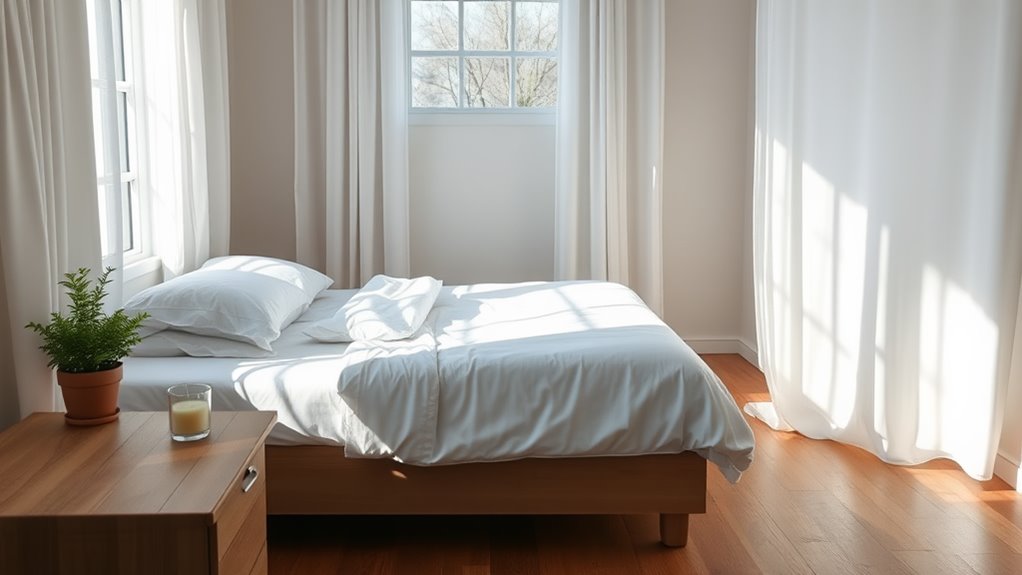
Many underestimate the power of natural light in transforming sleep quality, but it plays an important role in setting the stage for restful nights. When you embrace natural light, especially morning sunlight, you align your internal biological clock with nature’s rhythm. This synchronization is crucial for maintaining balanced circadian rhythms, which directly enhance sleep quality and overall well-being.
Morning sunlight exposure not only sets the right internal clock but also encourages melatonin production at night, promoting deeper sleep cycles.
Moreover, daylight exposure comes with benefits beyond sleep. Natural light boosts your vitamin D, strengthening your immune system and uplifting your mental health. When you engage in outdoor activities, you tap into an energy source that fuels cognitive function and enhances decision-making abilities.
Here are practical ways to incorporate more natural light into your daily routine:
- Begin your day without curtains, or take a few minutes to step outside and soak in the morning sunlight.
- Try a dawn simulator alarm clock to mimic sunrise and align your biological clock.
- Commit to outdoor activities, like morning walks, to increase your daylight exposure.
- Design your bedroom to welcome natural light, improving sleep quality effortlessly.
Embrace these steps, liberate your routine, and recharge your body with nature’s light.
Healthy Sleep Habits
Establishing healthy sleep habits is crucial for your overall well-being and can greatly improve your sleep quality. It starts by creating a consistent sleep schedule—set a bedtime that allows 7-8 hours of rest and wake up at the same time daily, even on weekends. This steady rhythm acts as your sleep framework, regulating your body’s internal clock and granting you freedom from restless nights.
Consider sleep tracking as a tool to monitor your patterns and optimize them for better sleep duration and quality.
Crafting a sleep-friendly environment is essential. Keep your bedroom between 60-67°F for a cooler, more comforting sleep. Minimize light with blackout curtains and reduce noise with earplugs or a white noise machine. Invest in supportive mattresses and pillows that liberate you from discomfort, and keep your space clutter-free.
Embrace mindfulness practices by establishing soothing pre-sleep habits. A calming bedtime ritual, like reading or taking a warm bath, helps shift your mind into a peaceful state. Limit bright light and unplug devices an hour before bed.
If sleep eludes you, engage in gentle activities, guiding yourself back to restfulness.
Sleep Transforms Overall Wellness
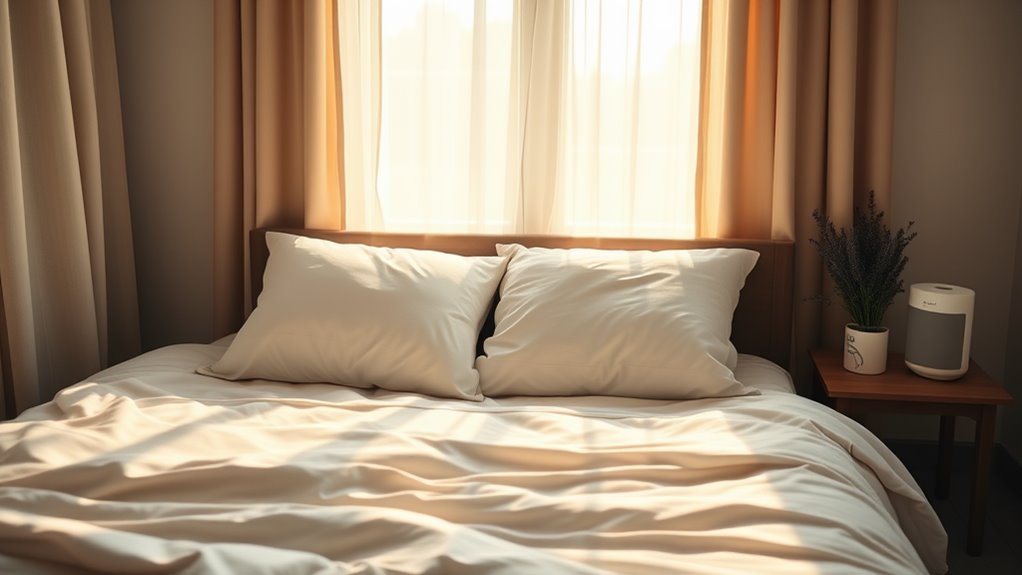
Chronicled throughout our exploration, the significant role of sleep as a cornerstone for both mental and physical health emerges robustly. Sleep acts as a essential agent in recovery, repair, and the regulation of critical bodily functions, underscoring its influence on everything from mental health to cardiovascular well-being.
Sleep deprivation conversely has dire repercussions, affecting cognitive capabilities, increasing susceptibility to a slew of physical and mental health issues, and impairing daily life functions. These revelations drive home the significance of sleep hygiene in fostering improved overall well-being and underscore the integral role sleep plays in a healthier, more balanced life.
Empowering individuals with practical sleep hygiene tips is essential to harness the full transformative power of sleep. Prioritizing regular sleep patterns can bolster the immune system, regulate hormones for a healthier weight, and maintain cardiovascular health.
Additionally, addressing sleep issues can mitigate mental health disorders like anxiety and depression, thereby rejuvenating social and work life by enhancing focus and productivity. Revisiting our daily habits toward achieving restorative sleep epitomizes a essential step towards sustaining long-term health and happiness.
Encouraging good sleep hygiene not only enhances life quality but also lays the foundation for a healthier future, underscoring sleep’s undeniable and thorough impact on wellness.





